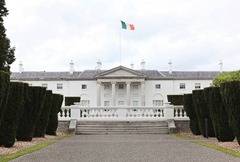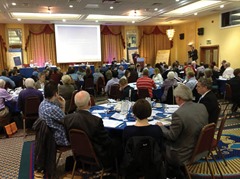Reviewing the Constitution
 Constitutional Convention Secretary Art O’Leary explains its rationale and its progress to date. Recommendations on six out of the eight subjects have been made with the remaining themes to be considered in the autumn.
Constitutional Convention Secretary Art O’Leary explains its rationale and its progress to date. Recommendations on six out of the eight subjects have been made with the remaining themes to be considered in the autumn.
The Programme for Government in 2011 contained a commitment for an initiative in participative democracy in Ireland to consider certain aspects of the Constitution to ensure that it is fully equipped for the 21st century.
The convention on the Constitution was established by resolutions of the Houses of the Oireachtas in July 2012 and was asked to consider and make recommendations on a range of topics as possible future amendments to the Constitution. The convention was to complete its work within 12 months.
For its part, the Government has undertaken to respond to the convention’s recommendations within four months by way of debates in the Houses of the Oireachtas and where it agrees with a particular recommendation to amend the Constitution, to include a timeframe for a referendum.
The convention began work in January this year and has now completed consideration of six of the eight issues on its work programme.
Membership of the convention comprises 66 citizens, 33 parliamentarians and an independent Chairman, Mr Tom Arnold. The 66 citizens were selected randomly by a polling company using the electoral register and is generally representative of Irish society in terms of gender, age, region, social class and occupational status.
Political parties and groups in the Dáil and Seanad nominated representatives on the basis of their relative strengths in the Oireachtas. Political parties represented in the Northern Ireland Assembly were invited to nominate one representative each.
How does it work?
Prior to each meeting, the convention invites submissions from members of the public, civil society and advocacy groups. This is a critical element of the process and the convention was delighted to receive thousands of submissions already this year.
 The convention members established an academic and legal group and a panel of experts to provide them with objective information and advice. This group is made up of political scientists, constitutional lawyers and academics with specialist expertise in each of the subjects under discussion.
The convention members established an academic and legal group and a panel of experts to provide them with objective information and advice. This group is made up of political scientists, constitutional lawyers and academics with specialist expertise in each of the subjects under discussion.
The convention meets at weekends and over the two days it considers public submissions and hears presentations from a wide range of experts and advocacy groups. An important feature of the convention’s working arrangements is that members also spent considerable time in small roundtable discussions, teasing out the detail of the issues being considered. The outcome of these group discussions is then reported back to the full convention so that all members get the benefit of the thinking at individual tables.
The real success of the convention has been the level of commitment and engagement shown by the members, who are not paid for their time for the eight working weekends during 2013. Initial fears that the discussions would be dominated by politicians have proved unfounded and the citizen members have made a significant contribution to the forum. For their part, the politicians have been more than willing to share their knowledge and experience, the breadth of which has impressed (and often surprised!) the citizens.
Members of the public can make submissions via the website (www.constitution.ie) and all convention documents, information and reports are easily accessible. All meetings of the convention are also livestreamed from the site.
Art O’Leary is Secretary to the Constitutional Convention and was previously Director of Committees, Information and Communications in the Houses of the Oireachtas.





